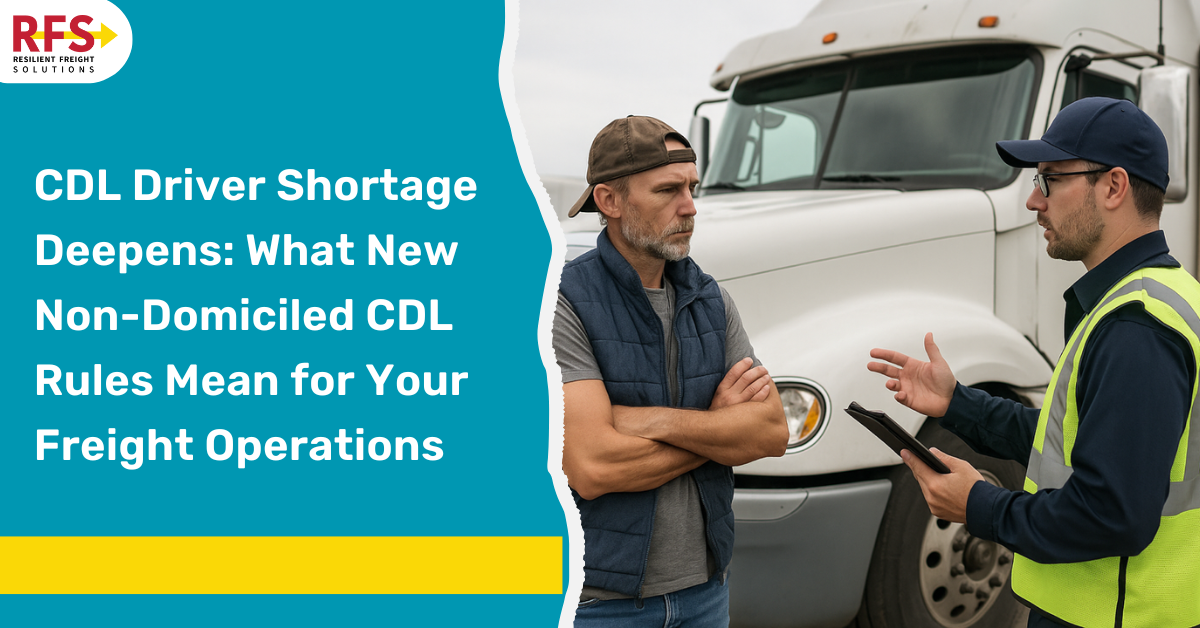The U.S. trucking industry is already feeling the pressure from a years-long driver shortage. As freight volumes rebound, demand for reliable drivers continues to outpace supply. But a recent rule change by the Federal Motor Carrier Safety Administration (FMCSA) could make matters worse—especially for carriers and shippers relying on non-domiciled (foreign-based) drivers.
On September 26, 2025, the FMCSA issued an interim final rule that severely restricts how states issue Commercial Driver’s Licenses (CDLs) to non-domiciled drivers. The move comes in response to safety concerns, compliance audits, and a recent fatal crash that brought national attention to oversight issues in some state licensing agencies.
So what exactly is changing—and why should shippers and logistics professionals care?
What is a Non-Domiciled CDL?
A non-domiciled CDL is a commercial driver's license issued by a U.S. state to an individual whose permanent residence (domicile) is outside of the United States. These are typically issued to noncitizen drivers legally authorized to work in the U.S. but who do not have U.S. citizenship or permanent residency.
Under previous rules, many of these drivers could qualify using Employment Authorization Documents (EADs) or work permits. Now, that flexibility is going away.
What the New FMCSA Rule Says
The Interim Final Rule: Restoring Integrity to Non-Domiciled CDL Issuance outlines several key changes:
-
Only certain employment-based immigration categories are eligible for a non-domiciled CDL. Acceptable visa types now include H-2A (agricultural), H-2B (non-ag), and E-2 (treaty investor) categories.
-
EADs alone are no longer accepted. Drivers must present a valid foreign passport and Form I-94/I-94A indicating lawful entry and employment eligibility.
-
CDL expiration dates are now tied to immigration status. The license must expire on the earlier of the I-94 date or one year.
-
State licensing agencies must verify immigration status through USCIS SAVE.
-
States must revoke or downgrade licenses if the driver’s lawful status changes or expires.
Additionally, the U.S. Department of Transportation is threatening to withhold federal highway funding from states that fail to comply, putting pressure on states like California and Texas, where many such licenses have been issued.
Why This Matters: Real Impacts for Shippers and Carriers
This rule is not a small administrative tweak—it has real implications for the freight industry:
-
Driver Pool Shrinks: Thousands of drivers may lose eligibility to operate under their current CDL.
-
Recruitment Gets Harder: Carriers may find it harder to recruit and retain qualified drivers, especially for cross-border and regional operations.
-
Capacity Crunch Worsens: With fewer drivers on the road, available truck capacity could contract further, pushing rates higher.
-
Compliance Burden Increases: Carriers will need to invest more time and effort in verifying driver eligibility and maintaining up-to-date documentation.
-
Potential Impact on Pricing: As driver availability tightens and capacity becomes more limited, freight rates are likely to rise. Shippers may see increased costs, particularly in high-demand lanes and time-sensitive markets.
What You Should Do Now
Whether you're a shipper, freight broker, or carrier, now is the time to take proactive steps:
-
Audit Your Driver Base: Identify any drivers with non-domiciled CDLs and verify their visa category and documentation.
-
Watch State Compliance Updates: Follow how your state's DMV or SDLA is responding to the new rule.
-
Plan for Capacity Risk: Build contingency plans in case key routes or drivers are impacted.
-
Update Your Partners: Keep customers informed about how regulatory changes may affect service levels or availability.
-
Work with a Trusted Logistics Partner: At Resilient Freight Solutions, we help clients navigate regulatory shifts while ensuring freight keeps moving—on time, every time.
Final Thoughts
The FMCSA’s new rule is designed to improve safety and standardize compliance across states. But the side effect could be a sharper, more immediate contraction in available driver capacity—especially in high-demand corridors.
If your freight strategy involves long hauls, time-sensitive deliveries, or recurring routes across states with high volumes of non-domiciled drivers, now is the time to assess your exposure.
At Resilient Freight Solutions, we stay ahead of regulation so you don’t have to. Contact us today to learn how our Concierge-Style Logistics Management approach can help your business stay resilient and compliant.
👉 Visit us at resilientfreight.com or email us at howdy@resilientfreight.com to schedule a free consultation.





Post a comment